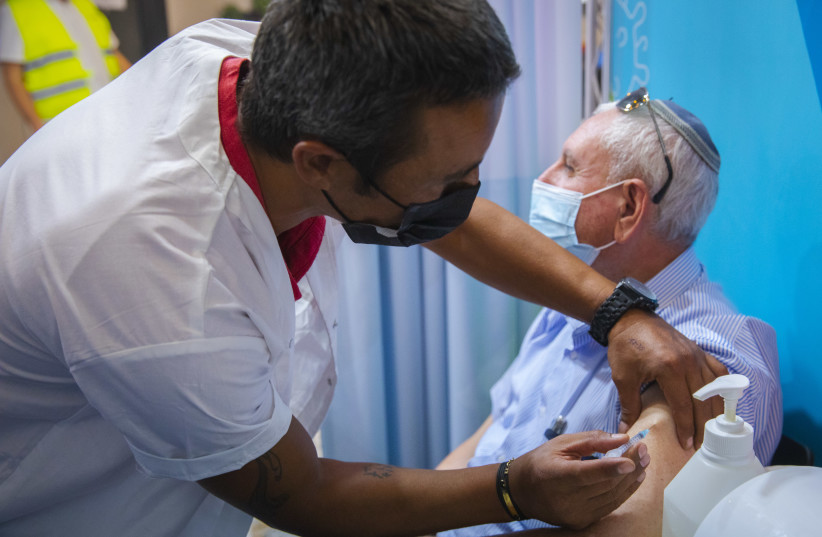Israel’s Pandemic Response Team was warned last Tuesday night that Israel could go from being reasonably protected against Omicron to not being protected at all within just a month.
As a result, the team – along with the COVID-19 Vaccination Advisory Board – voted to allow the country’s highest risk population to receive a fourth shot of the Pfizer COVID vaccine, sparking controversy in Israel and around the world.
Health Ministry Director-General Prof. Nachman Ash has still not approved the recommendation – and may not – as more data about the likelihood of developing serious infection from the Omicron variant is starting to emerge.
But why did the committee make a recommendation if it did not have all the data?
The presentations shown to the committee by the COVID-19 National Information and Knowledge Center – a division of the Israel Defense Forces – as well as by a separate joint medical research team could be the reason for what seemed like an unexpectedly bold decision.
“Within a month or two, the protection in Israel could be almost back to where it was before vaccines,” a report by the knowledge center warned. “The transition from Delta to Omicron will make Israel go from being reasonably protected to being almost not protected at all.”

In its presentation, which The Jerusalem Post reviewed, the center showed that the protection afforded people ages 60 and older who received a third dose is expected to decline from 75% to only 25% within a month as the Omicron variant becomes the dominant strain in Israel.
Part of the reason for this is that the vaccine wanes quickly, as explained by a separate presentation to the committee made by researchers from the Health Ministry, the Weizmann Institute of Science, Hebrew University, the Technion and the Gertner Institute.
A graph presented by the Weizmann Prof. Ron Milo showed that the Pfizer vaccines began to wane after only three months for both the second and third doses.
In Israel, most of the elderly population (845,779 people) received their booster shots more than four months ago.
“The excellent defense against infection by the Delta variant from the third dose begins to erode,” the slide said.
It showed that the third shot at first provided four times more protection than the second one but stressed that “the noted protection against infection with the Delta variant for those vaccinated with the booster begins to decline.”
The same slide presentation added that preliminary analyses do not show a decrease in the vaccine’s benefit against severe morbidity, but there is a problem getting reliable results on this data point due to the small numbers of cases so far.
IN GENERAL, the vaccines have been found to be less effective against Omicron than Delta, the researchers said.
“The protection of the booster from infection against the Omicron variant is lower than against the Delta variant,” they said. “The Omicron wave is on the rise and immunity is on the decline.”
The researchers mapped out a four-part scenario that put Israel in a real rush to decide about a fourth shot.
“Within two to four weeks, infections are expected on a very large scale, so the time for decision-making is short,” they said, demonstrating four phases, the first having already passed.
Phase one: Delaying the onset of the Omicron spread in the community. Time estimate: finished.
Phase two: Transition from individual infection events per day to morbidity at a level similar to that of Delta. Estimated time left: a week.
Phase three: Transition to a level of high morbidity, meaning moving from between 500 and 1,000 new infections per day to between 5,000 and 10,000. Time estimate: one to two weeks.
Final phase: Hospital overload as people infected with Omicron develop severe illness, more individuals contract influenza and medical personnel enter quarantine. How long could this last? Based on the country’s experience with previous waves, up to two months.
Both presentations said that by offering a fourth shot, protection would be refreshed and therefore higher against infection and severe disease. That’s because in the first two months, the Pfizer vaccine offers optimal protection: 70% to 90% protection in month one and 50% to 70% in month two.
Regarding safety, the researchers showed that about half a million people had likely recovered from the virus and did not know it, and therefore took three shots of the Pfizer vaccine. These individuals experienced no unusual side effects, meaning that it is likely that a fourth dose would cause no harm either.
On the other hand, they said, “complete information about severe illness from Omicron may only come when it is already too late… In the face of Omicron, there is significance to taking action in the initial stages of the wave.”
